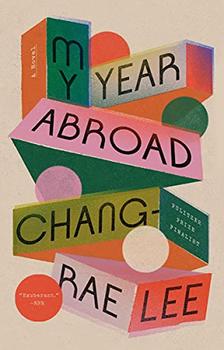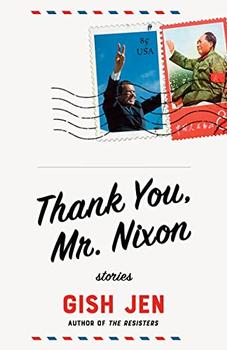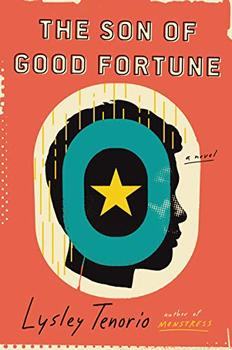Summary | Excerpt | Reviews | Beyond the book | Read-Alikes | Genres & Themes | Author Bio

Critics' Opinion:
Readers' Opinion:
First Published:
Feb 2021, 496 pages
Paperback:
Feb 2022, 496 pages
 Book Reviewed by:
Book Reviewed by:
Elisabeth Cook
Buy This Book
The name of Chang-rae Lee's novel My Year Abroad is a joke — in a good way. Not only insofar as Lee is a seasoned author and the title could belong to an unimaginative personal essay written by a university student, but because on its surface the plot, too, calls to mind an eye-rolling cliché: a young American man discovers himself in Asia through adventures packed with equal parts wisdom and hijinks. However, as Tiller Bardmon, the young American man in question, explains, that's not what's going on here:
… I apologize if this seems like one of those sojourning gweilo stories, in which some willful Western dude ventures abroad and learns the local ways and uses them to gain the trust of the natives and in turn show them how it's really done, say, dispatching a malign princeling while saving a beautiful serf girl in the process. You know, 'Fish in strange water ultimately enhances the water' sort of tale. Well, I'm here to say that's not how it will go down. My presence did not fundamentally change anything, anywhere, for better or worse.
As in this passage, Lee's novel unrolls in a lively first-person style containing plenty of linguistic leaps and performative humor. The approach lightly pokes fun at the type of literary posturing that might appear in the exact kind of narrative Tiller assures the reader this is not, while also revealing a gentle sadness behind the protagonist's flourishes.
One-eighth Korean, aware of his white-adjacent privilege and inclined to consider himself relatively insignificant, Tiller seeks a sense of identity in others and eventually latches onto the mentorship of Pong Lou, a Chinese American businessman he meets in his suburban hometown while awaiting a college semester abroad. Before long, Tiller's plans are sidelined by Pong and his associates, who sport delightfully sketchy names like Lucky Choi and Bags Patel. Pong sees promise in Tiller and takes him under his wing, first enlisting his help as an unofficial taste-tester at his frozen yogurt chain called WTF Yo! and later carting him along to Hawaii, Hong Kong and Macau to assist in plans for marketing an Indonesian "health tonic" called jamu.
Multiple factors complicate what could otherwise be a straightforwardly entertaining narrative. One is the intermittent presence of a second timeline in which Tiller has come back from his time abroad and is seeking to distance himself from its alleged trauma as he pursues a relationship with an older woman named Val, who is in witness protection with her young son Victor Jr. after having turned in her white-collar criminal husband and is coincidentally of one-eighth Asian descent herself. Lee playfully explores many facets of racial and ethnic identities, as well as how gender intersects with these identities. For example, rather than gaining access to Asian cultures and women in a way that benefits him — as might be expected in a travel storyline revolving around a man — Tiller is the one who seems subject to the whims of both female and male Asian characters, some of whom consider him an exotic curiosity, and finds himself pressured into a variety of acts ranging from karaoke to sex.
Despite its impressively consistent word-gymnastics, Lee's style can become cloying at times, and it fails to effectively carry the story over its nearly 500 pages and two full timelines that somehow make the novel feel simultaneously like too much and not enough. The storyline with Val is more thoroughly wrapped up than the one with Pong, which isn't as satisfying. Still, the book's ambitious construction comes alive through Tiller's elaborate assessments of the world around him, the theatrics of which are balanced by a profound dose of pathos that serves to blend the themes, style and overarching mood.
As My Year Abroad both challenges and deconstructs the "year abroad" experience, it calls into question the romanticized pursuit of individual success — the idea of someone striving to carve out their way in a world filled with peril. In the process, it explores how people may use the pursuit of money and power to escape their fear of ordinary sadness. The result is a touching, inventive dissection of the unsustainable drive for continual achievement.
![]() This review was originally published in The BookBrowse Review in February 2021, and has been updated for the
February 2022 edition.
Click here to go to this issue.
This review was originally published in The BookBrowse Review in February 2021, and has been updated for the
February 2022 edition.
Click here to go to this issue.

If you liked My Year Abroad, try these:

by Gish Jen
Published 2022
The acclaimed, award-winning author of The Resisters takes measure of the fifty years since the opening of China and its unexpected effects on the lives of ordinary people. It is a unique book that only Jen could write - a story collection accruing the power of a novel as it proceeds - a work that Cynthia Ozick has called "an art beyond art. It is ...

by Lysley Tenorio
Published 2021
From award-winning author Lysley Tenorio, comes a big hearted debut novel following an undocumented Filipino son as he navigates his relationship with his mother, an uncertain future, and the place he calls home.





The House on Biscayne Bay
by Chanel Cleeton
As death stalks a gothic mansion in Miami, the lives of two women intertwine as the past and present collide.

The Flower Sisters
by Michelle Collins Anderson
From the new Fannie Flagg of the Ozarks, a richly-woven story of family, forgiveness, and reinvention.

The Funeral Cryer by Wenyan Lu
Debut novelist Wenyan Lu brings us this witty yet profound story about one woman's midlife reawakening in contemporary rural China.
Your guide toexceptional books
BookBrowse seeks out and recommends the best in contemporary fiction and nonfiction—books that not only engage and entertain but also deepen our understanding of ourselves and the world around us.